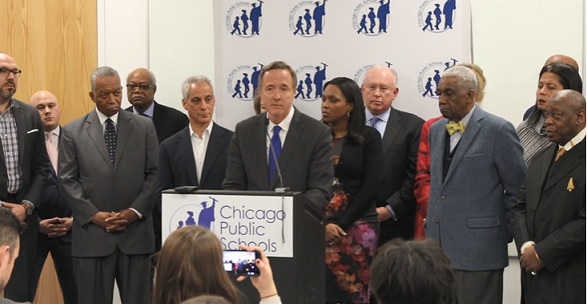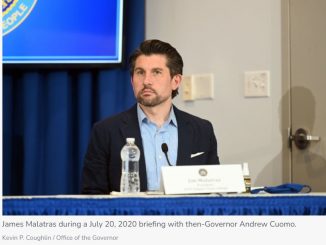
By Juan Perez Jr., Bill Ruthhart and Hal Dardick, Chicago Tribune
Chicago Public Schools CEO Forrest Claypool resigned Friday, becoming the second district leader appointed by Mayor Rahm Emanuel to leave office amid allegations of wrongdoing.
Claypool was accused of orchestrating a “full-blown cover-up” by the district inspector general, who called for the CEO’s ouster in a blistering report given to the school board Wednesday. Emanuel staunchly defended his longtime ally for two days, but after Claypool met with all six board members Thursday, sources said it was clear he did not have their full support.
That lack of backing, paired with the intense scrutiny the investigation had brought to Emanuel’s administration, led Claypool to decide to step down, a source said.
At a late afternoon news conference that seemed more like a poignant retirement party than the political funeral of an ally, Emanuel noted the length of his relationship with Claypool and lauded academic and financial improvements at CPS under Claypool’s leadership.
“An individual in time is judged by the entirety of their service,” Emanuel said. “When you look at Forrest’s service … he has always gone to work with his sleeves rolled up, ready to get the job done.”
School board President Frank Clark said Claypool’s resignation is effective Dec. 31. CPS Chief Education Officer Janice Jackson, who has long been seen as the heir apparent to the district’s top office, was named as interim CEO. The board will vote on her appointment at its Jan. 24 meeting, Clark said.
Claypool on Friday again apologized for his actions. Neither he nor the mayor responded to questions from reporters.
“I am experienced enough to know that I’ve accomplished all that I can accomplish here at CPS,” Claypool said. “I hope that when this chapter of my career is written, people will say, even good men can make stupid mistakes.”
While Claypool is Emanuel’s second school chief in a row to resign while accused of impropriety, his alleged transgressions are nowhere near as serious of those of his predecessor, Barbara Byrd-Bennett, who was ultimately sent to prison for taking kickbacks.
But a report from CPS Inspector General Nicholas Schuler was scathing in its criticism of Claypool. The district CEO “repeatedly lied” during an ethics investigation involving the top CPS attorney, the report said.
Schuler on Friday said the latest upheaval at the district’s top ranks could have been avoided if Claypool agreed to remove General Counsel Ron Marmer from overseeing a contract with his former firm, Jenner & Block. CPS hired the firm, which was still making severance payments to Marmer, to manage a civil rights lawsuit against the state of Illinois that was ultimately dropped.
“If they’d owned up to it and they removed him, I don’t think this would’ve been a serious discipline issue,” Schuler said. “They could’ve gone public with this, asked for the board to ask for an exception, have this aired publicly. But I think the investigation showed that Mr. Claypool didn’t want this to be public.”
Until Friday, Claypool was not only a longtime survivor in the rough-and-tumble world of city and state politics, but someone who was viewed as the guy to call in during times of trouble.
Among those who relied on his political and managerial skills were former U.S. Sen. Paul Simon, former Mayor Richard M. Daley, Pat Quinn as state treasurer and high-level political consultant David Axelrod.
In each case, Claypool left key campaign, business and administrative posts not only with his reputation intact, but also with an image as someone who could fix problems others couldn’t — even if he ruffled some feathers in the process.
At the start of his first term in 1989, Daley installed Claypool as chief of staff. When things got tough at the Chicago Park District, Daley sent in Claypool. Later, Daley brought him back to City Hall as the mayor faced scandals connected to his top police officials and City Council floor leader.
Claypool served eight years as a Cook County commissioner, styling himself as an effective reformist counterweight to former President John Stroger and, later, son Todd Stroger.
When Emanuel became mayor in 2011, he put Claypool in charge of the CTA, where he avoided fare hikes and oversaw the tricky but ultimately successful and lauded rebuild of the Red Line South. As Emanuel started his second term in spring 2015, he picked Claypool to be his City Hall chief of staff. A few months later, however, the mayor dispatched Claypool to CPS.
Claypool was Emanuel’s third schools chief, and his selection marked a reversal of course for a mayor who previously turned to outsiders to set policy at one of the nation’s biggest public school systems.
The mayor’s first selection, Jean-Claude Brizard, lasted a little more than a year before losing Emanuel’s confidence. He resigned in October 2012, not long after a seven-day teachers strike ended.
Brizard’s successor, Barbara Byrd-Bennett, brought with her an impressive resume of school leadership in New York, Cleveland and Detroit. She resigned after less than three years on the job while embroiled in a federal investigation into kickbacks that led to her conviction and imprisonment.
Claypool was hired to bring stability to the district after Byrd-Bennett’s abrupt departure. He inherited a financial mess, and also faced a potential labor shutdown by the Chicago Teachers Union that wasn’t settled until a contract was reached minutes before a threatened strike deadline in October 2016.
For much of his tenure, Claypool was the voice of doom as cutbacks and even the shutdown of schools was threatened if the state couldn’t overhaul its education funding formula. Claypool’s team embarked on aggressive cost-cutting plans, presented annual budgets with massive gaps state lawmakers were expected to fill, instigated furlough days and slashed school-level spending partly because of the district’s collapsing enrollment.
And as with previous schools administrations, Claypool presided over massive amounts of short- and long-term borrowing that brought much-needed cash into the system at a long-term cost to future generations.
But the district’s financial picture brightened, a bit, when state legislators finally came to terms on an education funding plan that bolstered the CPS bottom line.
Now yet another new leader will have to confront the district’s ongoing challenges.
“I think it’s the right decision for CPS, I think it’s the right decision for the students and their families,” Schuler said. “It’s a way for the district to move on and work on establishing institutional credibility, which it needs to do at this point.”
jjperez@chicagotribune.com
bruthhart@chicagotribune.com
hdardick@chicagotribune.com
Betsy Combier
betsy@advocatz.com
Editor, Advocatz
Editor, NYC Rubber Room Reporter
Editor, Parentadvocates.org
Editor, New York Court Corruption
Editor, National Public Voice
Editor, NYC Public Voice
Editor, Inside 3020-a Teacher Trials




Be the first to comment